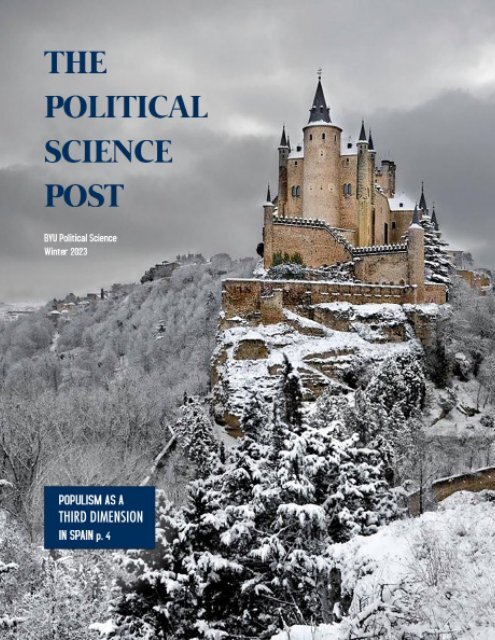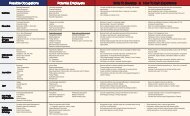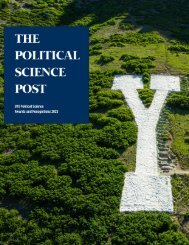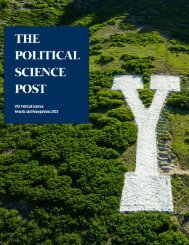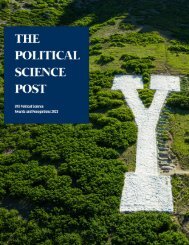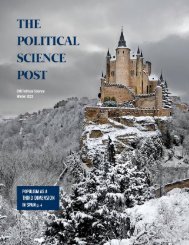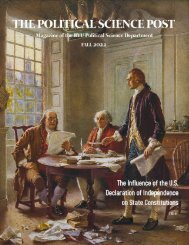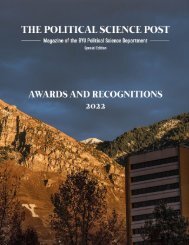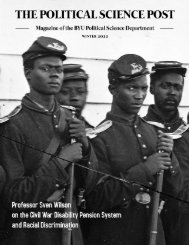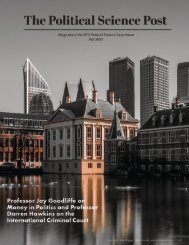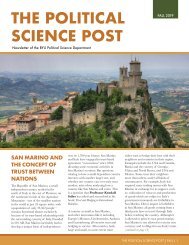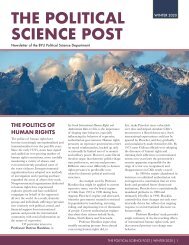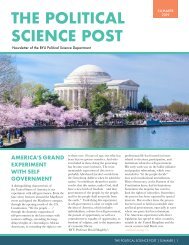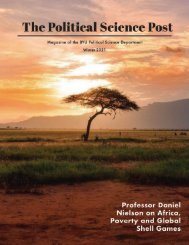You also want an ePaper? Increase the reach of your titles
YUMPU automatically turns print PDFs into web optimized ePapers that Google loves.
TABLE OF CONTENTS<br />
FOREWORD 2<br />
POPULISM AS A THIRD DIMENSION<br />
IN SPAIN 4<br />
EVENTS AND PROGRAMS 7<br />
POLITICAL PHILOSOPHER 15<br />
ALUMNI SPOTLIGHTS 17<br />
STUDENT SPOTLIGHTS 19<br />
FACULTY SPOTLIGHTS 22<br />
FACULTY PUBLICATIONS 25<br />
CONCLUSION 29<br />
Publisher:<br />
Jay Goodliffe, Chair<br />
Editor:<br />
J. Matthew Clarke<br />
The BYU Department of Political Science, consistent with the aims of<br />
a BYU education, intends to foster “Lifelong Learning and Service.”<br />
We hope to provide our alumni with intelligent, thoughtful and<br />
sophisticated analysis of important issues, and to act as a catalyst for<br />
service in our communities, neighborhoods, nations and the world.<br />
Graphic Designers:<br />
Seraphina Johnstun,<br />
Abby Myers<br />
1
FOREWORD<br />
In this issue, we move to Spain during its particularly challenging 2016 election<br />
cycle. The struggles to build a governing coalition were aggravated by the influence<br />
of Spanish politicians using the rhetoric of populism, a term and point of discourse<br />
that has also gained significance in recent US elections. Professor Kirk Hawkins and<br />
his Spanish co-authors write about how populist ideas worked to deepen the divide<br />
between political parties in Spain in 2016, making coalition formation an almost<br />
insurmountable task. Populism is now a globally discussed ideal, as divisions that<br />
seem impossible to mediate continue to exist between citizens and the political elite.<br />
We also examine the influence of social media on correcting public opinion—in<br />
this case, opinions related to empathic behavior. Finally, we celebrate the scholarly<br />
accomplishments of our students during the now-annual College of FHSS Mentored<br />
Research Conference.<br />
We hope you enjoy this issue at the beginning of the new year.<br />
The Alhambra Palace, Granada, Spain<br />
2
3
The Third<br />
Dimension<br />
Examining Populism in Spanish Politics<br />
Kirk Hawkins<br />
The 2016 Spanish general election was held on Sunday, 26 June 2016,<br />
to elect the 12th Cortes Generales of the Kingdom of Spain. All 350 seats in<br />
the Congress of Deputies were up for election, as well as 208 of 266 seats in<br />
the Senate. No party had secured a majority in the 2015 election, resulting in<br />
the most fragmented parliament since 1977.<br />
Ensuing negotiations in late 2015 failed to produce a stable governing<br />
coalition, paving the way for a repeat election on 26 June 2016. The political<br />
deadlock marked the first time that a Spanish election was triggered due to<br />
failure in the government formation process. Podemos and United Left (IU)<br />
joined forces ahead of the election to form the Unidos Podemos alliance,<br />
along with several other minor left-wing parties.<br />
Opinion polling going into the election predicted a growing polarization<br />
between this alliance and the People’s Party, which would be fighting to<br />
maintain first place nationally. This turbulent divide in Spanish governance<br />
gave a third influencing group of politicians—the “populists”—significantly<br />
greater influence, since neither of the traditional left and right parties<br />
achieved a winning formula for the Spanish populace.<br />
Professor Kirk Hawkins and his co-authors, Hugo Marcos-Marne and<br />
Carolina Plaza-Colodro (both from the University of Salamanca), study<br />
this third group of influential populists from an ideational approach in their<br />
article, “Is populism the third dimension? The quest for political alliances<br />
in post-crisis Spain.” Therein, they describe the way populism functions<br />
in an actual state; in this case, 2016 Spain. They also defend the ideational<br />
approach to populism by arguing that populist rhetoric has significant<br />
4
5<br />
consequences for government formation and the<br />
coalition choices of political parties.<br />
Populism refers to a range of political stances that<br />
emphasize the idea of “the people” and juxtapose<br />
this group against “the elite.” It is frequently<br />
associated with anti-establishment and anti-political<br />
sentiment. Populism has roots in the thoughts of<br />
Edmund Burke, John Locke and Adam Smith.<br />
A common approach to defining populism is known<br />
as the ideational approach, so called because<br />
it emphasizes that populism should be defined<br />
according to specific underlying ideas, as opposed<br />
to common economic policies or leadership<br />
styles that populist politicians sometimes display.<br />
The core principles of idealistic or “ideational”<br />
populism are as follows.<br />
In ideational populism, there are two primary<br />
units of analysis: ‘the people’ and ‘the elite.’ As<br />
described by political analysts, ‘the people’ are<br />
viewed as virtuous and homogenous, while ‘the<br />
elite’ are seen as dangerous ‘others’ who attempt to<br />
deprive the people of their rights, values, prosperity,<br />
identity, and voice. There is an antagonistic<br />
relationship between these two units, and the idea<br />
of popular sovereignty—the rule of ‘the people’—<br />
underlies this dynamic and irreconcilably divides<br />
the parties.<br />
Using two attempts of government formation<br />
in Spain during 2016 as an example, Hawkins<br />
and his co-authors show that incorporating a<br />
populist dimension of competition alongside the<br />
two traditional issue divides in Spain (left-right<br />
and center-periphery) can successfully explain<br />
agreements where approaches restricted to the two<br />
traditional dimensions fail. Essentially, populism<br />
forms a third, “ideational” dimension with its own content,<br />
one that can be considered alongside strong ideological<br />
dimensions in formal spatial analysis, and which<br />
influences alliances among political parties.<br />
The ideational approach does not argue that populism<br />
overrides traditional issues and ideologies. Unlike<br />
traditional ideologies such as liberalism, socialism, or<br />
conservatism, populism is not consciously articulated and<br />
speaks to only limited numbers of issues on its own. The<br />
thin, transitory nature of populous discourse means that<br />
it must be combined with more traditional ideologies to<br />
have comprehensive programmatic content. Thus, there<br />
are populists on both the right and the left, all of whom<br />
share a similar way of framing their (very different) issue<br />
positions.<br />
Similarly, populism<br />
played an important<br />
role in determining<br />
the outcome of the<br />
November 2022 U.S.<br />
midterm elections.<br />
Election results<br />
appear to have been<br />
dominated by an<br />
anti-populist majority<br />
that rejected the rise<br />
of global populism<br />
for many reasons,<br />
but mostly due to the<br />
concern about the rise<br />
of global authoritarianism; most populist candidates (on<br />
the right but also the left) did poorly.<br />
“Unlike<br />
traditional<br />
ideologies such<br />
as liberalism,<br />
socialism, or<br />
conservatism,<br />
populism is<br />
not consciously<br />
articulated and<br />
speaks to only<br />
limited numbers<br />
of issues on its<br />
own.”<br />
Spanish elections in 2015 and 2016 necessitated either<br />
a coalition government or a minority government with<br />
substantive support from third parties. Populist positions<br />
may have modulated the order of preferences of the major
parties in a way that explains the coalition outcomes.<br />
Because populism was generally rejected by the larger<br />
traditional parties such as the PSOE, it made the leftwing,<br />
non-populist Ciudadanos the PSOE’s party first<br />
choice. Thus, populism in the ideational sense has<br />
the ability to influence which parties are perceived<br />
as potential allies in negotiations and resulted in<br />
agreements reached in 2016 Spain between left and right<br />
forces, as well as more pro-center positions.<br />
Since the article was published, the populist Podemos<br />
party has joined with another left-populist party,<br />
Izquierda Unida, to form Unidos Podemos, highlighting<br />
the ability of populism to unite otherwise dissimilar<br />
parties. Also, Spain has seen the emergence of a new<br />
populist party, Vox, that has split away the traditional,<br />
conservative People’s Party. Founded in 2013, Vox is<br />
currently led by party president Santiago Abascal, vice<br />
presidents Jorge Buxadé, Javier Ortega Smith, Reyes<br />
Romero, and secretary general Ignacio Garriga. Vox is<br />
identified as right-wing to far-right by academics and<br />
mainstream journalists.<br />
“A Revolution of Rights in American Founding Documents” was published in the Journal of Political Institutions and<br />
Political Economy: Vol. 3: No. 2, pp 124-147, 28 Jun 2022. © 2022 S. F. Abramson, M. J. Barber and J. C. Pope<br />
6
Bear Ears National Monument Trip<br />
Professor Adam Brown took his Politics of Public Lands<br />
class down to the Moab area the weekend of November<br />
12 to see dinosaur tracks, petroglyphs, national parks, and<br />
national monuments.<br />
EVENTS &<br />
PROGRAMS<br />
POLI 325, titled “Politics of Wilderness, National Parks,<br />
and Public Land Management,” examines the history,<br />
management, and legal environment surrounding federallyowned<br />
public lands in the west, particularly those managed<br />
by the National Parks Service, the Bureau of Land<br />
Management [BLM], the Forest Service, and the Fish<br />
and Wildlife Service. Students learned in the classroom<br />
about the paleontological, archeological, geological, and<br />
biological resources that compete for protection against the<br />
demands of tourism, development, extractive industry, and<br />
even deliberate vandalism.<br />
Students were able to touch 150-million-year-old allosaurus (top) and<br />
camarasaurus (left) tracks, causing many to exclaim about how much<br />
more impactful the physical example was than simply viewing fossils<br />
in a museum.<br />
7<br />
Seeing oil wells and mining activity so close to the northern<br />
boundary of Bears Ears National Monument—and so close to<br />
unprotected petroglyphs just outside the monument—invigorated<br />
discussions about how to balance impulses for preservation against<br />
modern society’s economic realities. Comparing the crowding at<br />
Delicate Arch (protected in Arches National Park) to the relative quiet<br />
at Corona Arch (on BLM land) drove home the costs of preservation,<br />
since “protecting” Delicate Arch results in so much publicity and<br />
visitation. Lessons from this experiential learning trip will stay with<br />
these students longer than anything taught in the classroom.
8
The Economics and Politics of Gender<br />
Discrimination<br />
The Economics and Politics of Gender Discrimination, a seminar led by Dr. Olga Stoddard and Dr. Jessica<br />
Preece from BYU Political Science, was held on Tuesday, October 25. The purpose of their research was to<br />
conduct a field experiment that examined the ways in which political parties could increase women’s desire to<br />
run for office (their “political ambition”). Experiments conducted by Dr. Preece and Dr. Stoddard revealed that<br />
women are considerably more competition-averse than men, and this likely contributes to why women are less<br />
likely to run for office. They found large differences in the response rates of men and women—men were twice<br />
as likely to respond as women. These results contradicted the limited research that suggested women and men<br />
respond similarly to political party recruitment.<br />
This paper is currently under review at the Journal of Business Economics and Organization.<br />
Dr. Olga Stoddard and Dr. Jessica Preece of BYU Political Science<br />
9
Does the American Experience Still Matter?<br />
Professors Danielle Allen and William B. Allen, held a discussion together on November 29, 2022 at the<br />
Wheatley Institute Center. This father-daughter duo discussed educating for American democracy and<br />
citizenship across generations.<br />
They also discussed this question of whether the American Experience still matters, to which they responded<br />
with a resounding “yes.” There have always been moral choices in government, they said. The voice of liberty<br />
and equality has been there from the beginning of the United States. Moral equality integrates and binds<br />
together the entire Declaration of Independence. The affirmation of the good and the right is more important<br />
to repeat than the evidence of the evil. We have established the reality of the political experiment that resulted<br />
in the United States, and the principles upon which it is founded. But we have a burden of knowing that if [the<br />
American Experiment] does fail, it won’t fail because the experiment failed, but because we failed. “I want to<br />
counsel all of us to take patriotism seriously, and take love of country seriously, but not to turn it into a divine<br />
principle,” William Allen counsels.<br />
Danielle Allen is the James Bryant Conant University<br />
Professor at Harvard University where she also directs<br />
the Safra Center for Ethics. Her work focuses on political<br />
philosophy, ethics, and public policy. Professor Allen,<br />
a former Marshall Scholar and MacArthur Foundation<br />
Fellow, has chaired the Pulitzer Prize board and the<br />
Melon Foundation Board.<br />
William B. Allen is Professor Emeritus of Political<br />
Science at Michigan State University where he taught<br />
political philosophy, American government, and<br />
jurisprudence. A nationally recognized expert on George<br />
Washington and the American Founding, Professor<br />
Allen has served on numerous boards and commissions<br />
including the National Council on the Humanities and as<br />
chairman of the U.S. Commission on Civil Rights.<br />
10
Political Science Poster Conference<br />
The College of FHSS “Mentored Student Research Conference” at BYU was held on December 8, 2022. The<br />
event was a half-day poster conference made possible by the Mary Lou Fulton endowed chair in the College<br />
of Family, Home, and Social Sciences. All undergraduate and graduate students from any department or school<br />
in the college were invited to participate. The conference gave students an opportunity to orally present their<br />
research to other students, faculty members, and the public. Cash prizes were awarded in each category, and<br />
those who participate may apply to be reimbursed for graduate school applications.<br />
<strong>PSP</strong>C Winners<br />
1st Place: “Constitutional<br />
Choices with Populist<br />
Consequences”<br />
Ethan Johnson, mentored by Prof.<br />
Kirk Hawkins<br />
2nd Place: “Independents: The<br />
Worst of Both Worlds”<br />
Elle Diether & Jacob Lunt,<br />
mentored by Prof. Quin Monson<br />
3rd Place: “The ‘Electable’<br />
Woman: Effects of Gendered<br />
Language on Voting Behavior in<br />
Spain”<br />
Megan Baird, mentored by Prof. Liz<br />
McGuire<br />
11
Civic Engagement<br />
1st Place: “#themoderncampaign:<br />
Twitter Rhetoric during the 2022 Midterm<br />
Elections”<br />
Grace Burns, Kathryn Fontano, & Ashlan<br />
Gruwell, mentored by Profs. Alejandrea<br />
Aldridge & Chris Karpowitz<br />
Honorable Mentions<br />
“Electoral Costs for Congressional Corruption in 2022”<br />
Sarah Read Mitchell, mentored by Prof. Celeste Beesley<br />
“Corruption and Democracy”<br />
Julia Chatterley, mentored by Profs. Michael Barber & Darren Hawkins<br />
“Vote the Bums Out: What do Americans Really Think About Career Politicians?”<br />
J. Quincy Taylor & Elijah Whitaker, mentored by Prof. Alejandra Aldridge<br />
“That Which Goes Beep in the Night: The Game Theory of Cyberattacks” M. Grant Macgregor, mentored<br />
by Jay Goodliffe<br />
“#themoderncampaign: Twitter Rhetoric during the 2022 Midterm Elections” Grace Burns, Kathryn<br />
Fontano, & Ashlan Gruwell, mentored by Profs. Alejandrea Aldridge & Chris Karpowitz<br />
12
Brent Taylor Gala<br />
The Major Brent Taylor Foundation Gala was held on November 12, 2022 at the David Eccles Conference<br />
Center in Ogden, Utah. Kray Jubeck, one of our BYU Political Science students, gave a keynote address. Kray<br />
spoke about the scholarship he received and thanked Jennie Taylor and the Foundation for their support in his<br />
academic achievements. Attended by approximately 800 people, the Gala event raised funds for the Foundation<br />
and highlighted many of the recipients of Brent Taylor Foundation Scholarships, including both high school and<br />
university students from all over Utah.<br />
Major Brent Taylor was on his second term as the mayor of North Ogden when he took an unprecedented year<br />
of absence to serve his fourth deployment with the Utah National Guard in Afghanistan. In November 2018,<br />
Major Taylor was killed in Kabul, the first sitting U.S. politician to be killed in action since the Civil War. He<br />
is survived by his wife, Jennie Taylor, and seven children. To Brent, God, family, and country were everything,<br />
and it was this mantra that steered his life.<br />
Brent Taylor was born on July 6, 1976, in Ogden, Utah. From the start, he has always been a leader in his<br />
endeavors. He graduated from Chandler High School, where he was elected as student body president and<br />
earned an Eagle Scout award. Strongly rooted in his faith, Brent served a mission in Maceio, Brazil, for the<br />
Church of Jesus Christ of Latter-day Saints from 1998 to 2000 after his graduation.<br />
Contact Information:<br />
Major Brent Taylor Foundation<br />
2637 N Washington Blvd, Box #272<br />
North Ogden, UT 84414<br />
BYU Political Science student Kray Jubek giving a keynote address. Kray<br />
is a recipient of one of the Foundation Scholarships for leadership and<br />
academic performance.<br />
11 13<br />
801-628-3848<br />
info@majorbrenttaylor.com<br />
Donate at majorbrenttaylor.com.
Miguel Cervantes<br />
and Don Quixote<br />
Political Character from Spanish Fiction<br />
Don Quixote was, first and foremost, the brainchild of Miguel de Cervantes, a Spanish soldier who,<br />
down on his luck after a life of mediocre writing, inadvertently penned one of the great masterpiece of Western<br />
literature (1605, 1615): the tale of a bored, middle-aged dilettante who, infatuated with his obsessive readings of<br />
knights and chivalry, decides to abandon his former life and become a knight himself, traveling all throughout<br />
Spain to make things right, battle evil and protect justice. Cervantes may have written the original book, but it is<br />
the fictional Quixote who is our true guide through his idealistic political notions.<br />
Quixote, as written by Cervantes, was forever challenging authority in his native Spain, criticizing<br />
both the government and the church in the name of his own philosophy of universal humanism. The Knight of<br />
La Mancha, in all his extraordinary eccentricities and altruism, is considered amongst the highest echelon of<br />
humanity.<br />
Don Quixote had the courage to trust his intuition, to break forth from the masses to become who he was<br />
meant to be, to live an authentic life without being repudiated by the bullying or sneer remarks of people who<br />
couldn’t do the same for themselves.<br />
Don Quixote thought that if he couldn’t live forever, then he would live in such a way that should be<br />
remembered forever– to live heroically, accomplishing great deeds that deserve their chapters in the annals of<br />
history. Such is the political philosophy of Don Quixote. Even if one cannot be immortal, one still should live<br />
and act as if one deserved to be.<br />
Miguel Cervantes, 1547-1616<br />
Bibliography: de Cervantes, Miguel. Don Quixote. Translated by P. A. Motteaux, Wordsworth Editions,<br />
1992 and online-literature.com/cervantes/don_quixote/<br />
14
POLITICAL<br />
PHILOSOPHER<br />
15
George<br />
Santayana<br />
Jorge Agustín Nicolás Ruiz de Santayana y<br />
Borrás (December 16, 1863 – September 26, 1952),<br />
also known as George Santayana, was a Spanish and<br />
American philosopher, essayist, poet, and novelist. Born in<br />
Spain, Santayana was raised and educated in the U.S. from<br />
the age of eight, though he always retained a valid Spanish<br />
passport. He graduated from Harvard and later returned<br />
there to teach from 1889-1912, mentoring students such as<br />
W.E.B. Du Bois, T.S. Eliot, and Robert Frost. He moved<br />
permanently to, and spent the rest of his life in, Europe<br />
Santayana’s book, The Life of Reason, is arguably the<br />
first extended treatment of pragmatism written. Like many<br />
of the classical pragmatists, and because he was wellversed<br />
in evolutionary theory, Santayana was committed<br />
to metaphysical naturalism. He believed that human<br />
cognition, cultural practices, and social institutions have<br />
evolved so as to harmonize with the conditions present<br />
in their environment. The alternate title to The Life of<br />
Reason, “The Phases of Human Progress,” is indicative of<br />
this metaphysical stance.<br />
soon after.<br />
In The Life of Reason, he compared the “lived” world<br />
Santayana was a broad-ranging cultural critic spanning<br />
many disciplines. He was an early adherent of<br />
epiphenomenalism and was profoundly influenced by<br />
Baruch Spinoza’s life. He thought and, in many respects,<br />
with the “ideal” world, and Santayana sought therein<br />
to outline the ancient ideal of a well-ordered life. He is<br />
widely known for his aphorisms, especially the oft-quoted<br />
“Those who cannot remember the past are condemned to<br />
was a devoted Spinozist.<br />
repeat it.”<br />
“To feel beauty is a better thing than to understand how we<br />
come to feel it. To have imagination and taste, to love the best,<br />
to be carried by the contemplation of nature of a vivid faith in<br />
the ideal, all this is more, a great deal more, than any science<br />
can hope to be.”<br />
Jorge Agustín Nicolás Ruiz de Santayana y Borrás, The Life of Reason<br />
Bibliography: brittanica.com/biography/George-Santayana<br />
16
ALUMNI<br />
SPOTLIGHTS<br />
Baxter Oliphant<br />
BA Political Science<br />
Baxter Oliphant is a senior researcher at Pew Research Center, in Washington,<br />
DC, where he focuses on U.S. politics and policy research including partisan<br />
polarization, trust in government, gun policy and U.S. foreign policy.<br />
He received doctoral and master’s degrees in politics from Princeton<br />
University and holds a bachelor’s degree from Brigham Young University.<br />
His dissertation explored the impact of moral judgments on U.S. presidential<br />
elections. Before graduate school, he worked in political polling for<br />
campaigns and industry groups.<br />
Oliphant is a member<br />
of the American<br />
Association for Public<br />
Opinion Research and<br />
the American Political<br />
Science Association.<br />
15 17
Aerin Burns<br />
Christensen<br />
Aerin is a second year law student at J. Reuben Clark Law School. She grew<br />
up in Highland, Utah and loves working with people and finding solutions.<br />
Before starting law school she worked in local policy and interned with<br />
Senator Mike Lee in Washington, DC, 2019, for five months. Her internship<br />
on Capitol Hill allowed her to meet and work with some of “the most amazing<br />
people” she has ever met. “And don’t even get me started on the free reign<br />
over some of history’s most amazing buildings!”<br />
She says that “the Washington Seminar is such a worthwhile program and it<br />
has given indispensable insight into both my education and my future career!”<br />
She is looking for opportunities to work with law firms here in Utah.<br />
Brady Long’s career has taken him to law school and back to Capitol<br />
Hill as the head of our Government Relations group. Brady says that this<br />
journey is a reminder to our grads that wherever their career leads them, the<br />
principles and framework they learned in Poli Sci can be incredibly useful<br />
down the road.<br />
Brady K. Long<br />
Transocean is the world’s largest offshore drilling contractor based on<br />
revenue. Based in Vernier, Switzerland, the company has offices in 20<br />
countries, including Canada, the United States, Norway, the United<br />
Kingdom, India, Brazil, Singapore, Indonesia and Malaysia. It also has an<br />
office in Houston, Texas, where Brady works.<br />
Transocean’s website, found at deepwater.com, provides worldwide, rigbased<br />
well construction services to its customers by integrating motivated<br />
people, quality equipment and innovative technology, with focus on<br />
technically demanding environments.<br />
18
STUDENT<br />
SPOTLIGHTS<br />
Amy Kurtzweil<br />
Amy grew up in Crestwood, Kentucky, right outside of<br />
Louisville, and lived there until she came to BYU. While at<br />
BYU, she’s been blessed to participate in organizations such<br />
as the BYU College Democrats, the Political Affairs Society,<br />
the Political Review, research for professors in the Political<br />
Science Department, and an internship with the Utah State<br />
Legislature. These organizations here have connected her with<br />
some of the most “wonderful and inspiring people” she’s ever<br />
met, and have taught her so much about what it means to be<br />
involved with politics, and represent BYU in all we do.<br />
Her interest in politics first grew while she was in high<br />
school and she began learning more about issues affecting<br />
Kentuckians, such as coal in Eastern KY. She realized she<br />
didn’t like how a lot of issues were dealt with, and she felt<br />
like a lot of people were being underrepresented or not taken<br />
care of at all, which inspired her interest in working with/in<br />
politics someday. More than anything, she feels like politics<br />
and political science can teach us how to take care of each<br />
other, and she wants to dedicate her work to helping people<br />
and creating policies that will represent the needs of people<br />
from all walks of life.<br />
Amy’s plans for after she graduates right now is to attend law<br />
school. No matter what she does, she wants to make sure that<br />
she’s representing issues she cares about,<br />
and that she’s making a difference in<br />
people’s lives. Whether that’s working to<br />
help craft and pass important legislation,<br />
or litigation and representing certain issues<br />
and people in court, she wants to help<br />
others and make a meaningful difference<br />
in the world.<br />
Amy is currently the President of the BYU<br />
College Democrats organization.<br />
19
Ethan Johnson<br />
Ethan is a junior studying Economics and<br />
Political Science with a minor in Global<br />
Women’s Studies. He grew up in Kansas City,<br />
where frequent political conversations with<br />
his father sparked his political curiosity. He<br />
is just starting to serve a mission in Boston,<br />
Massachusetts.<br />
He received 1st Place in the FHSS College<br />
Mentored Research conference poster event,<br />
with this poster: “Constitutional Choices with<br />
Populist Consequences.” After graduation,<br />
Ethan plans to get a PhD and eventually return<br />
to BYU as a professor.<br />
Olivia Craig<br />
Olivia Craig is a Junior from Albuquerque, New Mexico<br />
studying political science. She has been interested in<br />
politics since she was young. In middle school, she<br />
volunteered as a Senate Page at the New Mexico State<br />
Capitol. Her interests have since evolved into her major.<br />
She enjoys politics because it’s a place to help others learn<br />
about what is happening in their community and find their<br />
voice.<br />
Last winter she was an intern in Idaho Senator Mike<br />
Crapo’s Washington DC office, where she worked with the<br />
press and legislative teams. Olivia is participating in the<br />
Utah State Legislature internship this winter semester. In<br />
the future, Olivia is interested in continuing to work with<br />
the legislative branch or getting involved with campaigns.<br />
Outside of politics, Olivia is an entrepreneur at heart. In the<br />
summer, she teaches swimming lessons to babies and does<br />
wedding florals.<br />
20
19<br />
PIC OF CAMPUS ON THIS PAGE
FACULTY SPOTLIGHTS<br />
Kirk<br />
Hawkins<br />
Kirk Hawkins grew up in Phoenix, Arizona, close to downtown, near the “tough part of town” and served a mission in<br />
Chili, Concepcion. He returned to BYU studying Mechanical Engineering, but a student friend told him about IR and he<br />
switched majors eventually graduating in IR and Area Studies.<br />
He went to Duke for his MA, and while he was in his PhD program in Political Science at Duke, his roommate, Matt<br />
Holland, introduced him to a friend, who then introduced him to a young woman who was studying in her PhD in Political<br />
Science at University of Wisconsin in Madison. They both did fieldwork in Chili, and they helped each other conduct<br />
their research. She had also grown up in Arizona, so they had a lot in common. She eventually flew out to Duke and they<br />
married soon thereafter.<br />
While Kirk was doing research in Venezuela during his dissertation in 1999, Hugo Chavez had just come to power after<br />
legitimate democratic elections, after a constitutional convention, and Kirk thought it would be interesting to interview<br />
Chavez or some of the people who worked around him. So he waited outside the gates of the Chavez political offices in<br />
Caracas and knocked on the door, and eventually got in. He never got to Chavez, saw him only in a military parade, but<br />
he spoke with a lot of the people who got Chavez into government. Soon, Venezuela moved away from democracy toward<br />
authoritarianism, and Maduro is the anointed heir to Chavez. Kirk studies some of the populist ideas that helped move<br />
Venezuela from democracy to a dictatorship.<br />
Kirk Hawkins teaches comparative politics with an emphasis on Latin America. His current research focuses on political<br />
organization and populism, and he directs “Team Populism,” a global scholarly network studying populism’s causes and<br />
consequences. Projects include the creation of a global populism dataset, experimental research on populism’s rhetorical<br />
mechanisms, and the mitigation of populism’s polarizing consequences for society. He studies the role of ideas in politics,<br />
and theorists who focus on ideologies, political ideas, not normative justifications for politics, but the spread and impact of<br />
ideas.<br />
Kirk received his Ph.D. from Duke University (2003), an M.A. in Political Science from Duke (1998), and an MA from,<br />
Brigham Young University (1995), and a B.A., Brigham Young University (1993) He is a Professor, Brigham Young<br />
University Department of Political Science, 2019-present (Associate Chair over Curriculum, 2020-present)<br />
22
19<br />
PIC OF CAMPUS ON THIS PAGE
FACULTY SPOTLIGHTS<br />
Darin Self<br />
Quin<br />
Monson<br />
Darin received a PhD from the Department of Government at<br />
Cornell University, Fall 2022. He specializes in Comparative<br />
Politics with a minor in International Relations. His research<br />
focuses on authoritarian incumbent parties, militaries, party<br />
systems, and democratization.<br />
His dissertation explained why some militaries support<br />
democratization. He argues that the military’s confidence<br />
in civilians is higher when the military and civilians share a<br />
vision of the national project, and when parties allied with<br />
the military are institutionalized and electorally strong.<br />
He tests this argument using archival research and elite<br />
interviews conducted in Indonesia and Paraguay, and crossnational<br />
quantitative data using an original dataset he created<br />
on military behavior during 150 different regime transitions<br />
following military-backed authoritarian rule.<br />
His other research looks at the role of authoritarian<br />
incumbent parties and their effects on various aspects of<br />
democratic development and consolidation. For example,<br />
he has working papers under review on how authoritarian<br />
incumbent parties affect democratic party system<br />
development globally, as well as how these parties restrain<br />
former military officers’ political prospects. These papers,<br />
along with other papers, can be found in Working Papers.<br />
Darin has received several awards and fellowships including<br />
the Fulbright Fellowship, Henry Luce Foundation Research<br />
Grant, Southeast Asian Research Group pre-Dissertation<br />
Fellowship, Foreign Language and Area Studies Fellowship,<br />
and has served as a Cornell Latin American Studies Program<br />
fellow. Darin began at BYU Political Science during<br />
Summer 2022.<br />
Quin has been with BYU Political Science since 2001<br />
and has held positions as Director of CSED, Associate<br />
Chair of BYU Political Science, Senior Scholar at<br />
CSED, Director of the BYU Office of Civic Engagement<br />
Leadership, and is a founding partner of the influential<br />
Y2 Analytics. He is an expert in polling and American<br />
Politics, speaks Portuguese, and plays saxophone since<br />
his youth, and was a member of BYU’s prestigious jazz<br />
band Synthesis. In the summer of 2022, he was promoted<br />
to Professor of Political Science at BYU.<br />
Alejandra is an Assistant Professor of Political Science at<br />
Brigham Young University. She studies how Americans<br />
think about democracy in an era of polarized politics<br />
and how presidents influence conceptions of democratic<br />
norms. Broadly, her research interests include survey<br />
methodology, experimental methods, presidential<br />
influence, voter behavior, presidential elections, and<br />
gender and politics. She graduated with her PhD in<br />
political science from Stanford University in 2022, and<br />
graduated from Brigham Young University with her BA<br />
in Political Science in 2016.<br />
On the side, she loves tennis, Crossfit, Sprinkles<br />
cupcakes, and dark chocolate.<br />
Alejandra<br />
Aldridge<br />
24
FACULTY PUBLICATIONS<br />
Kirk Hawkins<br />
The Ideational Approach to Populism<br />
Populism is on the rise in Europe and the Americas. Scholars increasingly understand populist forces in terms of their<br />
ideas or discourse, one that envisions a cosmic struggle between the will of the common people and a conspiring elite.<br />
In this volume, we advance populism scholarship by proposing a causal theory and methodological guidelines – a research<br />
program – based on this ideational approach. This book argues that populism exists as a set of widespread attitudes among<br />
ordinary citizens, and that these attitudes lie dormant until activated by weak democratic governance and policy failure.<br />
It offers methodological guidelines for scholars seeking to measure populist ideas and test their effects. And, to ground<br />
the program empirically, it tests this theory at multiple levels of analysis using original data on populist discourse across<br />
European and US party systems; case studies of populist forces in Europe, Latin America, and the US; survey data from<br />
Europe and Latin America; and experiments in Chile, the US, and the UK.<br />
The result is a truly systematic, comparative approach<br />
that helps answer questions about the causes and<br />
effects of populism.<br />
25
Adam R. Brown<br />
The Dead Hand’s Grip: How Long Constitutions Bind States<br />
In The Dead Hand’s Grip, Adam R. Brown examines constitutional specificity--or length--as a new way to evaluate<br />
how different policies govern citizens and regulate themselves. As Brown shows, many states and nations bloat their<br />
constitutions with procedural and policy details that other polities leave to statutory or regulatory discretion. American<br />
state constitutions vary in length from under 9,000 to almost 400,000 words. Constitutional endurance has often provoked<br />
fears that the dead hand of the past may reach into the present; lengthy constitutions strengthen the dead hand’s grip,<br />
binding states to a former generation’s solutions to modern problems.<br />
Brown argues that excessive constitutional specificity restricts state discretion, with three major results. First, it compels<br />
states to rely more frequently on burdensome amendment procedures, increasing constitutional amendment rates. Second,<br />
it increases judicial invalidation rates as state supreme courts enforce narrower limits on state action. Third and most<br />
importantly, it results in severely reduced economic performance, with lower incomes, higher unemployment, greater<br />
inequality, and reduced policy innovation generally. In short, long constitutions hurt states.<br />
While Brown’s analysis focuses on just one set of sub-national constitutions, their broad functions make his thesis relevant<br />
to those wanting to understand institutional variation between nations.<br />
26
Busby, Howat, Rothschild, Shafranek<br />
The Partisan Next Door<br />
The Partisan Next Door, 2021, published by Cambridge University Press, explores the idea that in the United<br />
States, politics has become tribal and personalized. The influence of partisan divisions has extended beyond<br />
the political realm into everyday life, affecting relationships and workplaces as well as the ballot box. To help<br />
explain this trend, we examine the stereotypes Americans have of ordinary Democrats and Republicans.<br />
Using data from surveys, experiments, and Americans’ own words, we explore the content of partisan<br />
stereotypes and find that they come in three main flavors—parties as their own tribes, coalitions of other<br />
tribes, or vehicles for political issues. These different stereotypes influence partisan conflict: people who hold<br />
trait-based stereotypes tend to display the highest levels of polarization, while holding issue-based stereotypes<br />
decreases polarization. This finding suggests that reducing partisan conflict does not require downplaying<br />
partisan divisions but shifting the focus to political priorities rather than identity—a turn to what we call<br />
responsible partisanship.<br />
Professor Ethan Busby at BYU Political Science, along with colleagues Adam Howat, Jacob Rothschild, and<br />
Richard Shafranek, authored this intriguing analysis of neighbors and friends who disagree with us, and why.<br />
27<br />
See: Ethan C. Busby, Adam J. Howat, Jacob<br />
E. Rothschild, and Richard M. Shafranek.<br />
The Partisan Next Door: Stereotypes of Party<br />
Supporters and Consequences for Polarization<br />
in America, October 2021. Available on<br />
Amazon and other online bookstores.
Gubler, Karpowitz, Monson, Romney<br />
Changing Hearts and Minds Through Media<br />
It seems intuitive: if you want to soften hearts toward marginalized people, show that they are human like<br />
everyone else. That’s the theory behind untold media messages depicting “outgroups” having relatable<br />
experiences, such as images of immigrants eating Thanksgiving dinner or videos of refugees hugging their<br />
children.<br />
Unfortunately, although humanizing messages do increase empathy in those who already view the group<br />
positively, they do almost nothing to increase empathy in people with high animosity toward an outgroup,<br />
according to new BYU research from political science professors.<br />
Using two experiments focused around Latinos, they found that while media messages humanized the<br />
Latino groups for all respondents, the treatment messages produced the largest empathy response among<br />
those with the most positive prior attitudes. A key intended target of the media messages—those with the<br />
highest pretreatment antipathy toward the out-group—reported a dramatically lower increase in empathy. In<br />
a second study, they show that unpleasant effects from dissonance are an important mechanism driving these<br />
differential results. In both studies, treatments designed to provoke increased empathic concern produced little<br />
change in policy attitudes. Thus, changing hearts using empathy-inducing media is a complex task, making<br />
the ability to change minds elusive.<br />
See: Joshua Gubler, Chris Karpowitz, Quin Monson and David<br />
Romney, Changing Hearts and Minds? Why Media Messages<br />
Designed to Foster Empathy Often Fail, The Journal of Politics,<br />
Volume 84, Issue 4, October 2022, Pages 1885-2311<br />
28
pic of campus or whatever. could also include Don Quixote<br />
bonus article in here<br />
IN CONCLUSION<br />
Words from Noel B. Reynolds, 2021<br />
Noel Reynolds, Professor Emeritus, BYU Political Science<br />
In all their teachings, the Nephite prophets recognized the human potential for both goodness and evil. Because of<br />
his infinite goodness, God prepared a plan of salvation, including the atonement of Jesuis Christ, so that in this state of<br />
probation, all humankind could choose the covenant path of his gospel by repenting and coming to him. And this path will<br />
prepare them as they follow him and endure to the end to become good like him so that they might enter into his presence<br />
and into eternal life. . . In Nephite discourse, the goodness of God was a phrase that was used in two different ways–to<br />
explain God’s provision for the possibility of eternal life for all men and women and to explain his miraculous support and<br />
deliverances, day by day, for those who are enduring to the end on the covenant path. The Book of Mormon portrays the<br />
goodness of God as the divine feature he desires all his human children to emulate and to incorporate into their souls.<br />
29<br />
See Noel B. Reynolds, “The Goodness of God and His Children as a Fundamental Theological Concept in the<br />
Book of Mormon,” Interpreter: A Journal of Latter-day Saint Faith and Scholarship, Vol. 46, 2021, at 131-156.<br />
28
30


